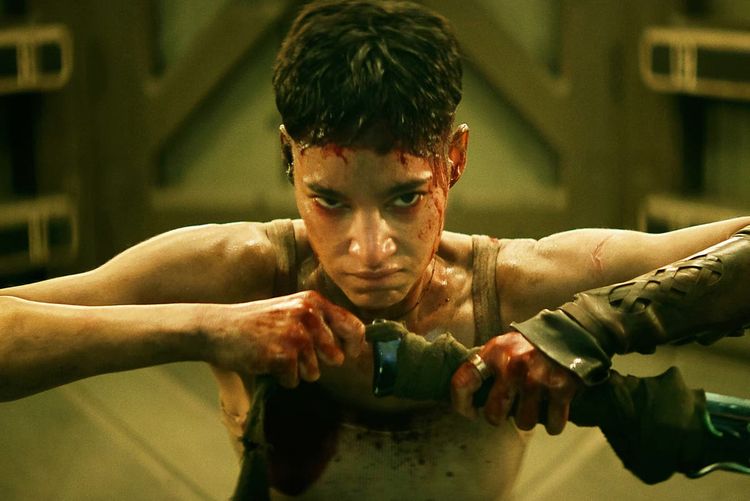Rebel Moon is a Star Wars rip-off that dares to break George Lucas’s unwritten rule

"Stay Updated With Our Film Critic's Weekly Newsletters"
Sign Up For Our Free Cinematic Email
The movie Rebel Moon was not always an obvious copy of Star Wars. In fact, it was originally meant to be a part of the Star Wars universe. The director, Zack Snyder, had an idea for a story about a small farming community taking on the empire. He pitched this idea to the people who owned the rights to Star Wars in 2012, but they turned it down. He also tried to pitch a video game adaptation of the same idea, but that was also rejected. So, he decided to remove any Star Wars references and sell his idea to Netflix as its own original story. The second part of the story, called The Scargiver, was released on Netflix on Friday.
A valid argument can be made that Rebel Moon is just as much of a copycat as Star Wars, given that Star Wars took inspiration from Akira Kurosawa's The Hidden Fortress back in 1977. Our critic Clarisse Loughrey highlights Kurosawa's influence on Rebel Moon, noting that the plot closely resembles that of Seven Samurai. (Star Wars has also utilized this structure, as evident in multiple episodes of The Mandalorian.) However, there's a catch. Despite Rebel Moon's blatant plagiarism, there are instances where it diverges from Star Wars in ways that Star Wars has never explored.
Rebel Moon's main character sets it apart from its big budget predecessor. Kora, who went from a war orphan to a powerful soldier for the empire before turning rebel, takes center stage. In the first Rebel Moon installment, Kora is plagued by guilt over her past actions. In Part Two, we learn that she committed a heinous act in the past that led to her change of heart- she killed the emperor's innocent daughter as part of a coup. While the young girl somehow managed to survive, this twist gives Kora a darker edge that isn't often seen in hero characters. Sofia Boutella delivers a powerful performance as this complex, morally ambiguous protagonist- something that the Star Wars franchise has yet to fully embrace.
Certainly, the concept of being redeemed is a recurring theme in Star Wars. It's evident from the time Han Solo appears towards the conclusion of A New Hope, where he gives up his mercenary lifestyle. Similarly, in Return of the Jedi, Darth Vader throws the evil emperor into a pit to save his offspring Luke. The Rise of Skywalker, which wasn't very well-received, has a comparable redemption storyline, where Kylo Ren, portrayed by Adam Driver, surprisingly becomes a good character towards the end of the movie.
The concept of redemption in Star Wars is portrayed as quick and simple, with more focus on the character's downfall rather than their path towards redemption. Anakin's descent into the dark side is shown in great detail over the course of the prequel trilogy, while his journey back to the light is rushed in comparison. Like Kora, Vader is also responsible for the deaths of innocent children, which serves as the point of no return for Anakin. However, he eventually does redeem himself. In contrast, Finn in The Force Awakens starts off as a former Imperial Stormtrooper who immediately becomes a hero, with no showing of his past wrongdoing. In the Star Wars franchise, redemption is presented as something that can be easily attained without much effort. Rebel Moon takes a different approach and shows a more realistic and complicated version of redemption, which may not be as satisfying but is more true to life.
Boutella's character doesn't have a particular moment where she's forgiven, and there's no dramatic revelation where the bad guy's mask comes off, revealing their true face, like we see with Vader turning back into Anakin. Instead, we witness a character who has to live with the choices she's made, and slowly work towards making amends. Even though Star Wars has explored the idea of morally ambiguous heroes before, like in Disney+'s Andor series, there's always a sense of righteousness. It's a universe that's split into good and evil, and that's how it always is. Rebel Moon has elements of this black and white worldview, too (the villains are dressed as Nazi officers), but it also allows for a little more nuance when it comes to heroism.
In essence, Rebel Moon doesn't quite fit into a specific tone that's deemed appropriate for a mature audience, as it's too exaggerated and lacking depth. On the other hand, it's a bit too grim and graphic to be a hit with all ages like Star Wars. Additionally, its quality is just average. However, we should acknowledge that it attempts to portray its characters in a more profound manner. Star Wars, on the other hand, is struggling to find its footing with its numerous spin-offs and failures and could benefit from picking up a few tips.
. You can now watch 'Rebel Moon: Part Two - The Scargiver' on Netflix.













































